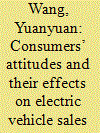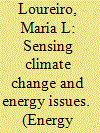|
|
|
Sort Order |
|
|
|
Items / Page
|
|
|
|
|
|
|
| Srl | Item |
| 1 |
ID:
185689


|
|
|
|
|
| Summary/Abstract |
There are close links and interactions among consumers' attitudes, the construction of charging infrastructure, and the diffusion of new energy vehicles (NEVs). This study focuses on consumers' sentient attitudes toward charging infrastructure and the effect of consumer attitudes toward the construction of charging piles and NEV sales using natural language processing technology and the panel vector autoregressive method. Consumers' sentient attitudes (i.e., positive, negative, and neutral) were inferred by analyzing consumer comments on charging infrastructure obtained from the internet. The key reasons for consumers' negative attitudes were further investigated, and the diversity in their attitudes was explored at the city level. The results show a growing concern for consumers about charging infrastructure since 2013. The overall satisfaction of consumers has constantly improved. The top pain points that cause consumers' negative attitudes are inconvenient charging, charging dilemmas, inability to install private charging piles, etc. Consumers' negative attitudes have a significantly positive impact on the charging piles’ construction. It also has a significantly negative impact on the sales of NEVs, but the effects are themselves short-term. Usually, the impact of negative attitudes is stronger than that of positive attitudes.
|
|
|
|
|
|
|
|
|
|
|
|
|
|
|
|
| 2 |
ID:
165256


|
|
|
|
|
| Summary/Abstract |
Social scientists and international relations scholars are increasingly analyzing data collected from Twitter or Facebook to examine political processes in which social media are used. The sheer amount of web 2.0 data and its heterogeneity (including text, photos, and videos), however, pose challenges which analysts frequently seek to overcome through a mixed method approach relying on both quantitative and qualitative methods. This article discusses the advantages and limits of using mixed methods for analyzing social media. We show how the shortcomings of quantitative methods such as sentiment analysis and data mining can be remediated by qualitative content methods in a study of the Twitter activity of private military and security companies (PMSCs).
|
|
|
|
|
|
|
|
|
|
|
|
|
|
|
|
| 3 |
ID:
172297


|
|
|
|
|
| Summary/Abstract |
Faced with the explosion of information about many other countries in the world on social media, the audience of a certain country may form different emotions, judgements and thoughts of such information, which are worthy of scrutiny. In this article, our aim is to examine Western users’ opinions towards China-related posts on Reddit.com through sentiment analysis of the comments following such posts. Using a statistical method, we collected and analysed the comments of 384 posts on China on Reddit.com, which were distributed in 36 subreddits. As the finding shows, the number of neutral comments exceeds the number of either positive comments or negative comments on China-related posts on Reddit.com. The results indicate that although most of the opinions on Reddit.com about China are neutral or irrelevant, they are largely neglected by the users or viewers who very much prefer negative or positive comments. Therefore, the perceptions on these opinions could be skewed due to this effect. In addition, for the citizens of any country, except for those who intentionally try to guide the direction of discussion on a topic, it is very unlikely for them to be really concerned or care about the events and incidents happening in another remote country.
|
|
|
|
|
|
|
|
|
|
|
|
|
|
|
|
| 4 |
ID:
168675


|
|
|
|
|
| Summary/Abstract |
This paper models landscape sustainability in the oil-producing Niger Delta area of Nigeria. Simon decision making cycle (intelligence-design-choice) was used to examine landscape sustainability planning issues. This approach involves three levels of application namely intelligence, design, and choice. Probability topic model was used in R software to identify the key problems in the Niger Delta area as (1) oil spillage impacts on water/land use (landscape capital) and (2) militancy (vandalism) and leadership (planning). These problems significantly, affect the landscape capital in the Niger Delta area. System dynamic simulation was applied to evaluate landscape capital under different scenarios of vandalism and different levels of revenue allocation. The study found that the greatest landscape capital can be achieved in 18.25 years if the revenue allocation to the Niger Delta oil producing states is increased from the current level of 13 percent to 21 percent. These results are consistent with UNEP's report that highlights oil spillages in the Niger Delta area as affecting landscape sustainability in the area.
|
|
|
|
|
|
|
|
|
|
|
|
|
|
|
|
| 5 |
ID:
145144


|
|
|
|
|
| Summary/Abstract |
Senkaku/Diaoyu islands dispute has caused tensions among China, Japan, and Taiwan for decades. Although the Taiwanese government keeps a low profile on the dispute, the issue has flared up online discussion among Taiwan’s netizens. Many consider Taiwanese people more pro-Japan than other countries in East Asia, as elder generation living on the island shares nostalgia toward Japan, and as its younger generation charmed by Japanese manga and anime, let alone Taiwan being the top donor to Japan’s 311 earthquake. In this vein, Taiwanese people should accommodate well with Japan. However, Senkaku/Diaoyu islands dispute may tell another story. The act of Japanese government to nationalize Senkaku/Diaoyu islands in 2012 has provoked anger among its neighbor countries. Are Taiwanese people in favor of Japan’s stance on Senkaku/Diaoyu islands dispute due to the attachment for Japan or the other way round? This paper applies text mining technique and sentiment analysis to the digital data of Taiwan’s largest bulletin board system station—PTT—established by college students and extracts postings concerning Senkaku/Diaoyu islands dispute in the past 4 years (2009~2012). By this bottom-up approach, we aim to examine Taiwan’s netizens’ emotion toward the two hegemonies—i.e., Japan and China—and to see whether the strong attachment to Japan has any impact on netizens’ opinions on the dispute.
|
|
|
|
|
|
|
|
|
|
|
|
|
|
|
|
| 6 |
ID:
177506


|
|
|
|
|
| Summary/Abstract |
In this paper we assess the sentiments and emotions related to climate change in the U.K. and Spain during the first six months of 2019, and how these relate to different preferences and concerns about energy policies. In doing so, we analyze Twitter messages related to climate change occurring in both countries, using natural language processing (NLP) tools. We find that messages in the U.K. related to climate change are less negative than in Spain; whereas the most evoked feeling in the U.K. (Spain) is anticipation (fear). However, our results show quite similar views about preferences for energy policies in these two Western European countries. In particular, renewable sources of energy are associated with positive perceptions, and coal with negative; whereas heteregoneous preferences are present in the case of nuclear energy. Information of this type may be relevant in order to understand public reactions and preferences towards mitigation and adaptation policies across countries. Our results complement and correspond quite well with those previously published in European surveys. We advocate the use of social media in order to assess sentiment and emotion analysis in close to real time events or manifestation of opinions, not properly covered by official statistics.
|
|
|
|
|
|
|
|
|
|
|
|
|
|
|
|
|
|
|
|
|